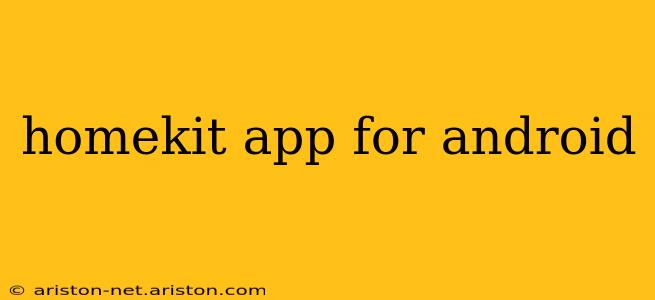While Apple's HomeKit smart home platform is deeply integrated into the iOS ecosystem, many Android users are keen to explore its capabilities. Unfortunately, there isn't a dedicated official HomeKit app for Android. This absence often leads to frustration and questions. This guide will explore the reasons behind this, available workarounds, and what the future might hold for Android users wanting to access HomeKit.
Why Isn't There an Official HomeKit App for Android?
The lack of an official HomeKit app for Android boils down to Apple's business strategy and its focus on creating a tightly integrated ecosystem around iOS and macOS. Apple's core business revolves around hardware and software synergy, and extending HomeKit's full functionality to a competing operating system would dilute that integration. It would also potentially compromise the security features central to HomeKit's design.
How Can I Control My HomeKit Devices from Android?
While a direct, official app is absent, several effective workarounds exist for Android users wanting to manage their HomeKit devices:
-
Third-Party HomeKit Apps: Several third-party apps provide varying degrees of HomeKit control on Android. These apps act as bridges, connecting to your HomeKit setup via Apple's HomeKit API. The level of functionality can differ between apps; some offer basic control, while others might include more advanced features like automations. It's crucial to research and choose reputable apps with strong user reviews to ensure security and stability. Remember to always check app permissions carefully.
-
HomeKit-Compatible Smart Home Hubs: Many smart home hubs and platforms offer broader compatibility than just their native ecosystem. Some, though not all, support HomeKit devices. This allows you to control your HomeKit devices through the hub's Android app. This can provide a more centralized control point if you have a mix of smart home devices from various manufacturers. However, remember that this might require additional hardware investment.
-
Using a Home Hub (Apple TV, HomePod, or iPad): The core of HomeKit's functionality relies on a Home Hub. If you have an Apple TV, HomePod mini, or iPad running iOS 16 or later and set up as a Home Hub, you can remotely access and control your HomeKit devices, provided the device is connected to the same Wi-Fi network. This leverages the home hub as the intermediary between your Android device and the smart home devices.
Can I use HomeKit on Android with a Home Hub?
Yes, but indirectly. A Home Hub (Apple TV, HomePod, or iPad) acts as a central control point. This means even though you lack a dedicated Android app, you can still control your devices through other apps that connect to your Home Hub, including the third-party apps mentioned above. However, the range and functionality depend on the capabilities of those third-party apps. The core aspect of using the Home Hub with an Android device remains indirect; you aren't using a direct Apple-provided application.
What are the limitations of using third-party HomeKit apps for Android?
The main limitation of using third-party apps is the potential lack of complete functionality. Apple's tight control over its HomeKit API might limit the features some third-party apps can offer. Furthermore, security is paramount. Always prioritize well-reviewed and established apps from reputable developers to minimize potential risks. Another drawback is that reliance on these apps may mean a lack of official support should any issues arise.
What is the future of HomeKit on Android?
The future of direct HomeKit access on Android remains uncertain. Given Apple's strategy, a dedicated Android app appears unlikely. The best path forward for Android users interested in HomeKit will likely continue to be via third-party apps or compatibility with other smart home hubs. However, the development and improvements of third-party options may offer increasing levels of control and functionality over time.
This guide provides a detailed overview of the landscape of HomeKit on Android. The lack of an official app is a significant hurdle, yet workable solutions exist for those wanting to integrate their HomeKit devices into their Android-centric smart home setup. Remember to always prioritize security and thorough research when choosing third-party applications.
